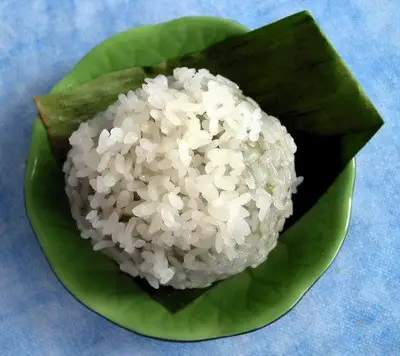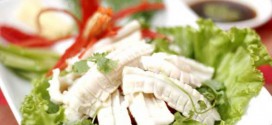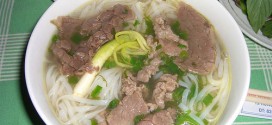The cake is a rice ball made of glutinous rice mixed with cud-weed (khuc)-most important ingredient and filled with green bean paste, pork, and spices.
Cud-weed grows during lunar January and February, when the drizzling rain lasts all day, and it can be found along the edges of rice fields. There are two kinds: “nep” and “te”. The latter is more flexible and fragrant and is preferred for making the cake.
First, the cudweed is washed, ground and then mixed with husked glutinous rice. Green beans, that are flayed and turned into paste after being cooked, are then added to the mixture. Finally, the cakes are sprinkled with grains of glutinous steamed rice.
As time goes by it is increasingly difficult to find cud-weed as fields are eaten up by development. For now, you still can find “banh khuc” in Hanoi. However, some bakers may not be using cud-weed and may substitute it with cabbage or water morning glory.

Wishing to have the chance to satisfy your hunger for “banh khuc”, you can visit cake stall at 69 Nguyen Cong Tru Street, that has been churning out “banh khuc” for years. Ms. Nguyen Thi Lan, the seller, has to hire locals in rural areas in Hanoi or in neighboring provinces to seek out the elusive cudweed. In winter, it grows in abundance so enough has to be collected to last the summer. The surplus will be dried and stored.
If you are in the old quarter of Hanoi, you might hear someone cry “Ai banh khuc nong day?” (who wants hot “banh khuc”?). You can stop them and ask if the “banh khuc” is from Ngoai Hoang village in Ha Noi, a place that is famous for having the most delicious and tasty “banh khuc”. Then, you can buy one for tasting. The cake should be served hot and dipped into a mixture of roasted and crushed sesame seeds and salt…
 Vietnamese Culture and Tradition
Vietnamese Culture and Tradition 

